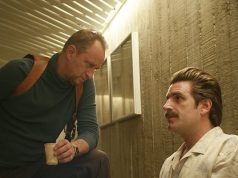
Jean-Claude Van Damme IS … Timecop! He’s the guy they send when you’re wasting time!
TIMECOP: Hey, you! Quit loitering there! You’re wasting time!
CITIZEN: What are you, the “time police”?!
TIMECOP: YES.
CITIZEN: Oh. My bad. Sorry, officer. (moves along)
Or at least that’s what I thought the movie was about. Turns out it’s actually about a meathead who travels through time to arrest other people who are traveling through time, because traveling through time is illegal unless you’re an authorized timecop — but even authorized timecops are only allowed to travel through time if it’s to arrest someone who’s doing it illegally (since “illegally” is the only way it can be done by non-timecops).
So time travel is sort of like murder. You’re not allowed to commit murder, and if you do, the government might arrest you and murder you, because only the government is allowed to commit murder, and only as a punishment for committing murder.
Whew! I’m exhausted, and I haven’t even started talking about the movie yet! “Timecop” stars Jean-Claude Van Damme, one of those oily mumblers whose central acting techniques are “punch” and “kick” and whose constant employment in the 1990s can only be attributed to a robust economy and the continued popularity of cocaine in Hollywood boardrooms. Van Damme plays Max, a Washington D.C. cop whose wife is murdered in 1994 just as she’s obviously about to tell him she’s pregnant. Max doesn’t know that’s what was on her mind, though, because he’s dim. All he knows is that he’s sad, and also fire hot and gun loud.
Then the movie jumps ahead into … THE FUTURE! Well, 2004. It was the future when the movie was made. You can tell it’s the future because now the big, boxy cars are covered in futuristic-looking steel, and because everyone’s 1994 hairstyles look out of fashion. Max is still very sad about his wife being dead, but he has thrown himself into his work, unhindered by his indecipherable Belgian accent. He’s a timecop, employed by the Time Enforcement Commission to go back and stop wrongdoers from altering the past to improve their futures. This is because, in the words of the scientist who first tells the government about the existence of time travel, “It turns out if you go back and change something, it’s serious.” This needed to be said because, I guess, no one listening had ever watched or read a single piece of science-fiction in their lives.
The government has tried to keep a lid on time travel, but people are somehow still doing it — enough that it requires an entire agency to chase them. And the way that TEC agents travel through time is exceedingly complicated: You have to sit in a little car, which speeds down a track toward a brick wall but disappears before it hits it. (There is no reason for there to be a brick wall at the end of the runway, except to manufacture false tension over whether or not the car will disappear in time.) You materialize in whatever time period you specified, only the car isn’t with you. No one knows where the car goes. It just disappears. So how do you get back to the future? You push a button on a remote control that you have in your pocket. This takes you back to where you started, and when you re-materialize, you’re in the car again.
And somehow people are doing this on their own, without the government facilities. They must have found a more streamlined method. I know it’s hard to believe that private industry could run something more efficiently than the government does, but there you go. I happen to know that a couple of dumb California teenagers time-traveled in a phone booth several years before “Timecop” even came out.
Anyway, one of the wrongdoers is a man named McComb (Ron Silver), a U.S. senator running for president in the current year, 2004. He’s a conniving, murderous, Machiavellian schemer, which makes him only slightly less palatable than anyone who actually ran for president in 2004. McComb has been hiring people to go back in time to raise money for his campaign — taking advantage of low stock prices immediately after the Wall Street crash of 1929, for example, or robbing a Confederate wagon train at gunpoint in 1863. Learning of this, Max goes back to 1929 to stop McComb’s lackey from manipulating stocks, and scolds the man about the dangers of causing ripples in time. Even the smallest action in 1929 could have terrible consequences for the future! Max and the guy fight loudly in his Wall Street office, many gunshots are fired, the office is torn apart, and finally they both disappear into the corridors of time in full view of dozens of witnesses. Thank goodness they got out of there before anything unusual happened.
Max can’t prove that Sen. McComb is dirty, but he’s on the case. McComb takes great comfort in knowing that the only thing standing between him and the presidency is Max, the way you would feel if the only thing standing between you and Shangri-La were a plate of ham. Detecting another ripple in time, the TEC sends Max and an internal affairs agent named Fielding (Gloria Reuben) back to Oct. 9, 1994, to see what’s up. Max is so stupid he doesn’t even realize that Oct. 9, 1994, is the day his wife was murdered. The ripple occurring on this date is that McComb is about to dissolve his partnership with a high-tech company, which the 2004 McComb now knows was a huge, costly mistake. The 2004 McComb shows up at the meeting to warn his younger self not to do it, and Max and Fielding are there, too, only it turns out Fielding is on McComb’s payroll, along with basically the rest of Washington D.C., and she double-crosses Max, and then McComb double-crosses her, and oy vey such a mess it is when dishonest people time travel.
Max eventually remembers that, oh yeah, his wife is getting killed tonight, and it finally dawns on him that her never-solved murder was the work of McComb, who traveled back to 1994 to kill Max but got his wife instead. This means that Max is justified in preventing his wife’s death, as he’ll simply be undoing the time-tampering that McComb did, and also because two wrongs make a right.
It also means that there will be two Maxes, a 1994 one and a 2004 one, which means two Jean-Claude Van Dammes. In this space we have already discussed Double Impact, in which Van Damme plays twins despite his proven inability to establish even one believable character, let alone two. In Timecop, he merely plays himself twice, which you’ll agree is much easier. Surely Max’s wife wonders what she did to deserve two Van Dammes in her life, especially when the alternative was to simply be murdered.
The final example of Max’s dumbness comes after he saves his wife and kills Sen. McComb in 1994. These are huge changes to the time continuum, obviously, so you’d expect that when he returns to 2004, things will be very different from how they were when he left. And they are different — the funny thing is, Max doesn’t seem to have expected it. He is baffled to find his boss (who died just as Max was leaving for 1994) alive and well, and astonished that Fielding no longer knows him, and stymied by Sen. McComb’s absence. “He disappeared 10 years ago,” someone tells him. Yeah, remember, Max? You killed him. Ring a bell? It should, because it just happened five minutes ago. How did this dingbat pass his timecop’s exam?
“Timecop” is not the worst film Van Damme ever made. Thanks to “Street Fighter,” it’s not even the worst film he made in 1994. But it is the worst film he ever made involving unnecessarily complicated time travel, and the worst one to include a hilariously gratuitous sex scene (although it could be argued that any sex scene involving Van Damme is gratuitous), and that’s good enough for me.
— Film.com





